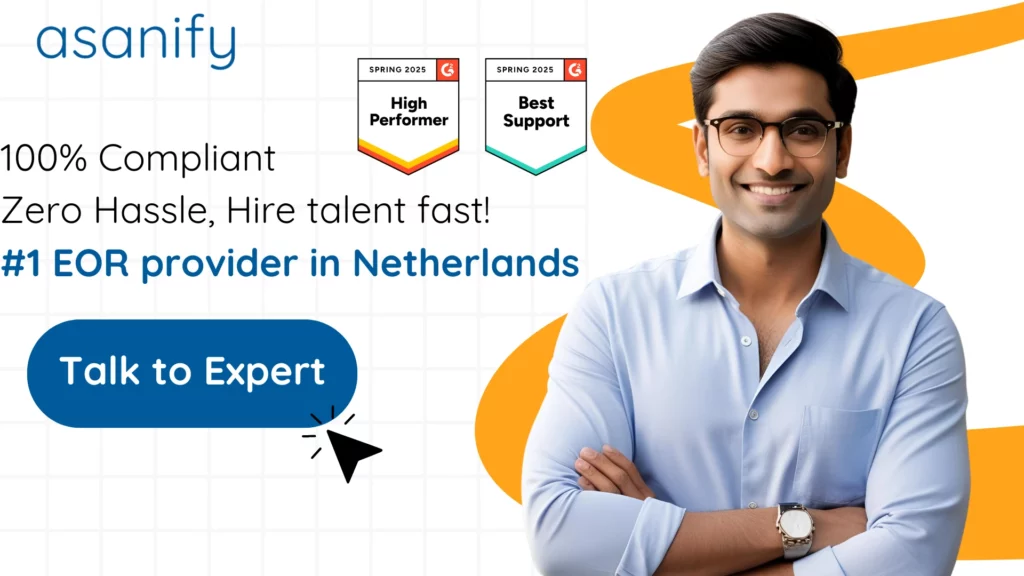The Netherlands has quickly become one of Europe’s most attractive nearshoring destinations in 2025. With its tech-savvy talent, robust legal environment, and exceptional digital infrastructure, the Dutch outsourcing landscape is ideal for companies aiming to build scalable and compliant operations within the EU. Whether you’re a UK-based startup looking for design support or a North American enterprise outsourcing AI development, the Netherlands offers a balance of quality, communication, and strategic value.
This guide provides a step-by-step overview for businesses looking to outsource work to the Netherlands — including benefits, challenges, key services, compliance rules, and cost comparisons. It also covers how Employer of Record (EOR) service providers can help streamline your cross-border outsourcing efforts.
Table of Contents
- What is Outsourcing and Why Do Companies Do It?
- Overview of the Outsourcing Industry in the Netherlands
- Why is the Netherlands a Hotspot for Outsourcing in 2025?
- What Types of Work Can You Outsource to the Netherlands?
- Three Commonly Outsourced Services in the Netherlands
- Step-by-Step Guide to Outsourcing to the Netherlands
- Best Practices to Make Outsourcing to the Netherlands a Success
- Pros and Cons of Outsourcing to the Netherlands
- Legal and Compliance Framework in the Netherlands
- Cost Breakdown – How Much Can You Save?
- Outsourcing Projects from the USA to the Netherlands
- Conclusion
- FAQs
What is Outsourcing and Why Do Companies Do It?
Outsourcing is a strategic approach where businesses delegate specific tasks, processes, or operations to external vendors with specialized expertise. It allows organizations to reduce internal overhead, scale more efficiently, and focus on core capabilities while accessing skills or tools they may lack in-house.
Companies outsource for various reasons: to save on labor costs, reduce time-to-market, gain access to multilingual support, or address compliance risks. While traditional outsourcing emphasized cost, today’s companies prioritize value—looking for specialized services, tech capabilities, and culturally aligned partners.
Modern outsourcing includes IT development, financial services, customer support, marketing, legal compliance, and even recruitment. The Netherlands, with its international workforce and cutting-edge infrastructure, supports all of these and more.
Overview of the Outsourcing Industry in the Netherlands
The Dutch outsourcing market is growing steadily, fueled by innovation, government incentives, and demand for EU-compliant service providers. The Netherlands excels in high-value, knowledge-intensive sectors like fintech, legal tech, SaaS, cybersecurity, and cloud development.
Amsterdam, Rotterdam, Eindhoven, Utrecht, and Groningen are major outsourcing hubs offering access to a multilingual and multicultural workforce. The country’s global trade legacy has fostered an open economy and excellent business infrastructure, ideal for both startups and Fortune 500 firms.
With advanced digital connectivity (among the top globally), cloud-based work management, and favorable Dutch labor laws, the Netherlands is positioned as a leader in nearshoring across Europe.
Why is the Netherlands a Hotspot for Outsourcing in 2025?
Strong Legal and Data Protection Environment
As an EU member, the Netherlands strictly adheres to GDPR, making it highly trusted for handling sensitive data. Dutch outsourcing contracts typically include IP protections, confidentiality clauses, and strict data processing guidelines.
Multilingual and Technically Skilled Workforce
Over 90% of the population speaks English fluently, in addition to Dutch, German, and French. Dutch professionals are known for their directness, efficiency, and cross-cultural communication — making them ideal collaborators for global clients.
Strategic Location for Nearshoring
Located centrally within Europe, the Netherlands offers seamless collaboration with the UK, France, Germany, and Scandinavian markets. Its timezone aligns well with most Western countries, reducing lags in feedback cycles and project iterations.
Favorable Business Climate
The country boasts one of the most efficient legal systems in Europe and has attractive tax policies for foreign investors. Dutch companies are used to working under strict SLAs and deliverables, providing consistent results in areas like software, finance, and compliance.

What Types of Work Can You Outsource to the Netherlands?
The Netherlands provides a versatile outsourcing landscape for businesses seeking precision, multilingual service, and regulatory alignment. Thanks to its highly skilled workforce, world-class infrastructure, and pro-business climate, the Netherlands is an excellent destination for outsourcing both technical and non-technical functions. Companies from the EU, UK, and North America frequently outsource to Dutch providers for strategic projects that demand quality, compliance, and innovation—not just low cost.
Whether you’re a scale-up in need of agile development or an enterprise seeking GDPR-compliant legal support, outsourcing services to the Netherlands delivers unmatched value in knowledge-intensive sectors.
Here are some commonly outsourced functions:
- Software development (cloud platforms, SaaS, mobile apps, custom tools)
- Finance and accounting (payroll processing, audit support, reporting, compliance)
- Legal services (contract lifecycle management, data privacy, IP support)
- Multilingual customer support (Dutch, English, German, French, and more)
- IT support and cybersecurity (infrastructure setup, helpdesk, data protection)
- Data science and analytics (BI dashboards, automation, machine learning)
- Creative services (UX/UI design, motion graphics, branding)
- Content localization and SEO (native-level copywriting, web content adaptation)
- HR and talent acquisition (recruitment process outsourcing, employee onboarding)
Outsourcing to the Netherlands enables companies to work with teams that combine technical excellence with a strong understanding of Western market expectations. The Dutch workforce’s fluency in English and familiarity with international business culture further reduces friction in cross-border collaboration, making it an ideal long-term outsourcing destination for regulated and quality-focused industries.
Suggested Read: EOR Netherlands: A Detailed Guide on Employer of Record 2025
Three Commonly Outsourced Services in the Netherlands
1. Software Development and Engineering
Dutch software engineers are highly sought after for their expertise in backend systems, mobile apps, AI/ML integration, and cybersecurity. The Netherlands hosts a strong tech startup ecosystem, and companies benefit from agile, scalable software teams that follow global best practices.
2. Legal and Regulatory Services
Many EU companies outsource GDPR advisory, contract management, and regulatory audits to Dutch legal professionals. The country’s proximity to European legal institutions (like in The Hague) makes it ideal for compliance-heavy sectors.
3. Multilingual Customer Support
With native English and Dutch speakers, plus fluency in German, French, and Spanish, the Netherlands is ideal for regional customer support operations. Dutch vendors specialize in eCommerce, fintech, and SaaS support through email, phone, and chat.
Step-by-Step Guide to Outsourcing to the Netherlands
- Define Scope: Identify the exact functions you want to outsource and establish KPIs, tools, and compliance requirements.
- Vendor Discovery: Shortlist providers based on specialization (e.g., tech, legal, HR). Platforms like Clutch, GoodFirms, or Asanify can help.
- Due Diligence: Verify legal credentials, data handling protocols, client testimonials, and language capabilities.
- RFP Process: Create and circulate a detailed Request for Proposal, then evaluate responses on pricing, timeline, and cultural alignment.
- Site Visit or Virtual Demo: Tour their facility or conduct a virtual onboarding review to assess communication practices and technical infrastructure.
- Contracting: Include NDAs, GDPR terms, liability clauses, SLAs, and intellectual property ownership clauses.
- Onboarding: Share SOPs, credentials, brand tone guides, and training assets with your outsourced team.
- Integration: Use project management tools like Jira or Monday.com to collaborate and monitor performance.
- Review and Optimize: Run quarterly performance evaluations and feedback cycles to improve results.

Best Practices for Successful Outsourcing to the Netherlands
- Be Transparent: Define expectations, cost boundaries, and deadlines early on.
- Assign a Vendor Manager: Designate one internal person to act as the main point of contact for smoother collaboration.
- Use Local EORs: Consider Employer of Record service providers for compliance in employee-related engagements.
- Train Your Vendors: Provide cultural, brand, and system training for consistent output.
- Set Communication Cadence: Weekly syncs, monthly retrospectives, and yearly reviews help maintain long-term efficiency.
Pros and Cons of Outsourcing to the Netherlands
| Pros | Cons |
| Native English-speaking, highly skilled workforce | Higher labor costs than Eastern Europe or Asia |
| Excellent legal and data compliance (GDPR, IP rights) | Smaller freelance market for ultra-flexible projects |
| Central location with timezone alignment for EU and UK | Strong worker protections may slow down onboarding in rare cases |
| Access to cutting-edge technology and reliable infrastructure | Limited cost arbitrage vs traditional offshore destinations |
Legal and Compliance Framework in the Netherlands
The Netherlands has a highly transparent business legal system. Outsourcing contracts typically cover data privacy (GDPR), IP rights, SLAs, and subcontracting. Companies outsourcing to Dutch vendors should verify certifications like ISO 27001 and EU-US Privacy Shield compliance.
When using Employer of Record service providers in the Netherlands, make sure labor contracts, payroll processes, and benefits are locally compliant. This can help you employ Dutch talent without setting up a legal entity.
Cost Breakdown – How Much Can You Save?
| Role | Monthly Cost (Netherlands) | Monthly Cost (Western EU/UK) |
| Developer | €4,200–€6,500 | €8,500–€11,000 |
| Legal Consultant | €3,800–€5,500 | €7,500–€10,000 |
| Support Agent | €2,400–€3,200 | €4,800–€6,500 |
Using Dutch vendors also helps you save on office leasing, equipment costs, and long-term liabilities, especially if you work with an EOR partner.

Outsourcing Projects from the USA to the Netherlands
US-based companies increasingly turn to the Netherlands for high-quality, compliance-oriented services with timezone-compatible delivery cycles. Dutch vendors are especially valuable for U.S. firms needing GDPR compliance, multilingual outreach, and trusted EU support.
Use Cases:
- U.S. fintech startups outsourcing EU tax audits to Dutch advisors
- SaaS companies building remote DevOps teams in Amsterdam
- U.S. marketing firms hiring Dutch translators for content localization in Europe
Suggested Read: Top 10 Staff Augmentation Companies in the Netherlands (2025)
Conclusion
Outsourcing to the Netherlands in 2025 is a powerful option for businesses seeking precision, compliance, and European integration. With its sophisticated infrastructure, talented workforce, and favorable regulations, the Netherlands offers a resilient outsourcing destination for long-term growth.
Whether you’re looking to build a remote team or tap into Dutch expertise via an EOR partner, the Netherlands delivers unmatched value for global firms.
FAQs
Yes, it offers highly skilled engineers and cloud infrastructure for tech projects.
Absolutely. Over 90% of Dutch professionals are fluent in English.
Yes, many firms offer HR BPO and payroll outsourcing, or you can use an EOR.
It’s not the cheapest, but offers excellent value through compliance, quality, and reliability.
No, you can work with vendors or EORs to avoid entity setup.
Fintech, SaaS, legal, compliance, eCommerce, and design.
Ranges from 3 months to multi-year, depending on project needs.
Yes, the Netherlands has a solid freelance ecosystem in IT and creative roles.
Jira, Slack, Google Workspace, Asana, and Zoom are common.
Amsterdam, Rotterdam, Utrecht, Eindhoven, and Groningen.
Not to be considered as tax, legal, financial or HR advice. Regulations change over time so please consult a lawyer, accountant or Labour Law expert for specific guidance.

